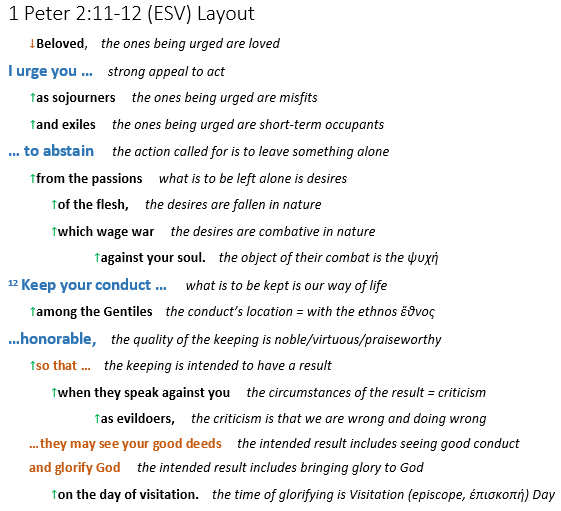Winsome Strangers - 1 Peter 2:11-12
Image

This outline continues a series preached in 2002. If I were going to preach this one again, I would probably simplify the outline. Too many outline levels gets confusing. In any case, it’s usually best not to enumerate out loud any deeper than the top level points of an outline, other than maybe the occasional quick list.
Introduction
The old adage says “When in Rome, do as the Romans.” Scripture teaches differently: When in Rome, be winsome strangers. From our study of 1 Peter 1, we know that believers are displaced strangers (1 Pet. 1:1), beloved strangers (1 Pet. 1:2), and born again strangers (1 Pet. 1:3). We find in our text that we must also be winsome strangers.
Increasingly, Christians are in hostile territory. What are we supposed to do?
We should seek to attract defectors. We should be winsome.
One of the Miriam Webster collegiate dictionaries defines winsome as “generally pleasing and engaging, often because of a childlike charm and innocence.” What Peter seems to have in mind is more of an earned respect.
How do we be winsome strangers in the way God desires? Our text reveals 2 steps.
Step 1: Be strong strangers
2:11 “I urge you…abstain from the passions of the flesh”
Notice 3 things about this command:
1. The command is strong. Note the formula, “Beloved, I urge you.”
The language here is like a person might talk to a family member who has self-destructive habit “Look, I care about you and I don’t want to see you ruin your life.” I recall my parents having some conversations like that with me, especially when I was a teen. Following that pattern, I’ve delivered a few “lectures” of that sort myself.
The point here is that Peter is applying strong pressure but is wrapping it in love—which ultimately makes the appeal stronger.
2. The command is rigorous: “abstain from.”
The term here is apecho (ἀπέχω), literally to “hold from.” Here it’s in the middle voice: “hold yourself from.”
What we’re to hold ourselves away from is “the passions of the flesh” (AV, NKJV, NASB: “fleshly lusts”). “Flesh” in the NT usually refers to our fallen humanness (though it sometimes just means the body or the physical in general).
Now the works of the flesh are evident: sexual immorality, impurity, sensuality, idolatry, sorcery, enmity, strife, jealousy, fits of anger, rivalries, dissensions, divisions, envy, drunkenness, orgies, and things like these. I warn you, as I warned you before, that those who do such things will not inherit the kingdom of God. (Gal. 5:19-21)
So these are (1) desires driven by our sinfulness, and (2) desires being employed by our sinfulness.
A church member was telling me about his favorite pistol, and somehow (wink) we got into a bit of ethical philosophy. Is his gun an evil weapon? If someone broke into his house, took the gun and used it to rob the bank, would it then be an evil weapon? We agreed that it’s an “evil weapon” either to do evil things or to act with evil intent.
The “passions of the flesh” here are desires that result in sinful choices and/or arise from sinful intentions.
3. The command is important.
Why? Peter gives us two reasons here.
Reason 1. We are “sojourners and exiles” (AV, “strangers and pilgrims”).
The two terms here are interesting. The first (πάροικος) refers to one who lives in a place that is not his home. The connotation is “misfits.” The second term (παρεπίδημος) refers to one who is living in a place temporarily (see 1 Peter 1:1).
Reason 2. Our souls are under attack. We’re at war internally: “which wage war against your soul.”
Summary: We’ve got to keep ourselves away from what weakens us and destroys us.
Step 2: Be conspicuous strangers
2:12 “Keep your conduct…honorable”
What: “conduct” (AV, “conversation”).
It means behavior, way of life. It’s a bit more than just the outward stuff we know people can see, but consistent habits of attitude and action.
How: “honorable” (AV, “honest”).
The term is kalos—beautiful, of good quality, free of defects, lacking a basis for appropriate criticism.
The same term appears in these passages.
In the same way, let your light shine before others, so that they may see your good works and give glory to your Father who is in heaven. (Matt. 5:16)
And while some were speaking of the temple, how it was adorned with noble stones and offerings…(Luke 21:5)
It isn’t just “keeping your nose clean;” it’s active.
In Galatians the “works of the flesh” are contrasted with the “fruit of the Spirit,” and this fruit parallels Peter’s “conduct honorable.”
But the fruit of the Spirit is love, joy, peace, patience, kindness, goodness, faithfulness, gentleness, self-control; against such things there is no law. (Gal. 5:22-23)
Why: We will be accused as evildoers.
Increasingly, the Christian way of life is seen in our culture as backward, primitive, ignorant, hateful or all of these. But human nature being what it is, Christians often really are sometimes backward, primitive, ignorant or hateful! Peter’s challenge is to make sure that the criticism we bring on ourselves is (a) the sort Daniel brought on himself, and (b) temporary (see 1 Pet. 3:16-17).
Why 2: We may eventually win over some our accusers.
2:12 “they may see your good deeds and glorify God on the day of visitation”
If “on the day of visitation” means “when Christ returns,” what sort of response by unbelievers does Peter have in mind here? Does he mean “they’ll hate us now but see the truth in the end,” or is he encouraging believers to hope some will see the honorable character of our way of life and be drawn to it now—and, as a result, praise God for it in the end?
We know that both of these outcomes can and do occur.
Jesus said,
If the world hates you, know that it has hated me before it hated you. If you were of the world, the world would love you as its own; but because you are not of the world, but I chose you out of the world, therefore the world hates you.” (John 15:18–19)
But He also said:
In the same way, let your light shine before others, so that they may see your good works and give glory to your Father who is in heaven. (Matt. 5:16)
Peter might be speaking of a short-term positive result later in this same epistle:
having a good conscience, so that, when you are slandered, those who revile your good behavior in Christ may be put to shame. (1 Pet. 3:16)
And consider Paul’s similar language here:
Do all things without grumbling or disputing, that you may be blameless and innocent, children of God without blemish in the midst of a crooked and twisted generation, among whom you shine as lights in the world. (Phil. 2:14–15)
What’s clear is that regardless of whether or not our honorable way of life is effective in producing a particular result here and now, it should have a winsome quality. It should be the sort of life that is winsome inherently, so that critics must willfully avoid the truth to keep despising it.
And couldn’t we all share stories of how the conduct of believers helped us or someone we know see the truth of the gospel?
Conclusion
We may not see it happen often, but we really can live lives that God uses win over lost and desperate sinners. We have the opportunity to act as winsome strangers.
Aaron Blumer 2014 Bio
Aaron Blumer, is a Michigan native and graduate of Bob Jones University and Central Baptist Theological Seminary (Plymouth, MN). He and his family live in small-town western Wisconsin, not far from where he pastored Grace Baptist Church for thirteen years.
- 66 views



Discussion